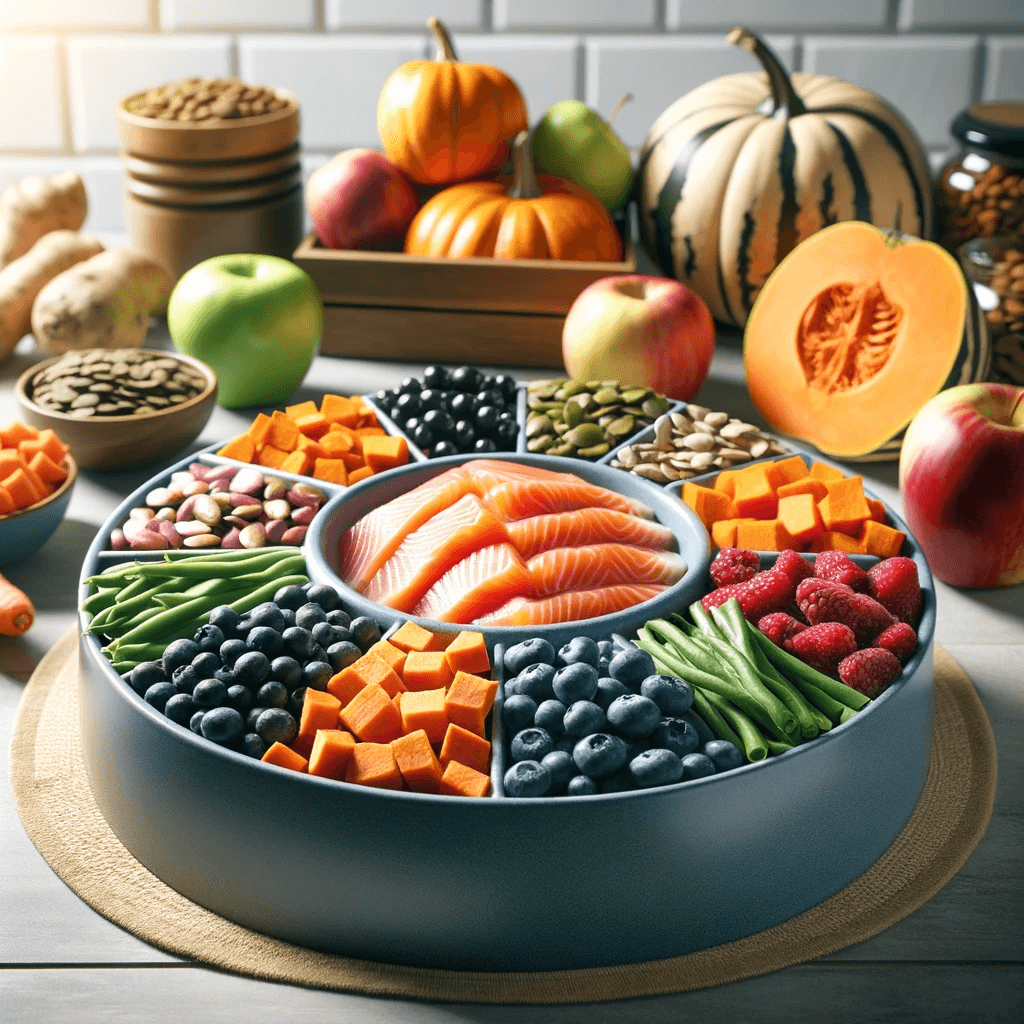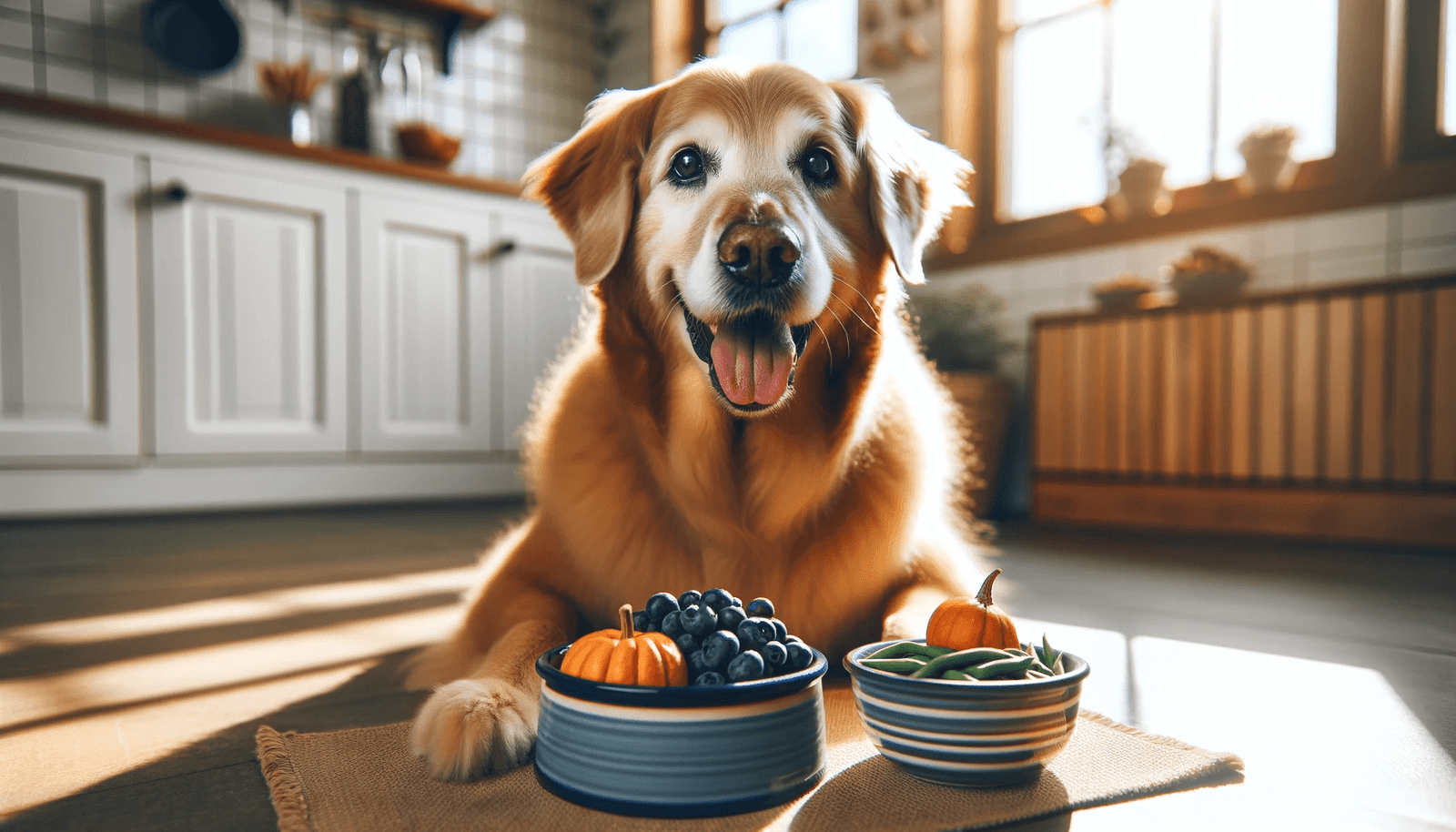25 Superfoods for Senior Dogs: Boosting Health in a Dog’s Golden Years
25 Superfoods for Senior Dogs

- Blueberries: Packed with antioxidants, blueberries can help combat free radicals and support cognitive function.
- Pumpkin: Low in calories and high in fibre, pumpkin aids digestion and helps manage weight.
- Oats: A great source of soluble fibre, oats support healthy digestion and maintain steady blood sugar levels.
- Green Beans: Full of vitamins and low in calories, green beans are great for weight management.
- Salmon: Rich in omega-3 fatty acids, salmon supports joint health and maintains a shiny coat.
- Sweet Potatoes: High in beta-carotene and vitamins, sweet potatoes are great for immune health.
- Apples: A source of vitamins A and C, apples also promote dental health through their crunchy texture.
- Spinach: Loaded with iron and antioxidants, spinach supports robust immune systems.
- Carrots: Good for dental health and rich in beta-carotene, carrots are a crunchy, nutritious snack.
- Sardines: These small fish are a powerhouse of omega-3 fatty acids, promoting joint and skin health.
- Turmeric: Known for its anti-inflammatory properties, turmeric can help with arthritis and joint pain.
- Chia Seeds: Rich in omega-3s and fibre, they aid in digestion and promote a healthy coat.
- Broccoli: High in fibre and vitamins, broccoli supports detoxification and offers anti-inflammatory benefits.
- Cottage Cheese: A good source of calcium and protein, it’s gentle on aging digestive systems.
- Kale: This leafy green is packed with vitamins and antioxidants, supporting overall health.
- Eggs: Offering high-quality protein, eggs also provide essential amino acids.
- Coconut Oil: Beneficial for skin and coat health, it also supports cognitive function.
- Quinoa: Gluten-free and rich in protein, quinoa is a good grain alternative for dogs with sensitivities.
- Beets: Rich in antioxidants and fibre, beets support liver and immune health.
- Flaxseeds: A source of omega-3s, flaxseeds promote a healthy coat and skin.
- Chicken: Lean protein like chicken helps maintain muscle mass in senior dogs.
- Yogurt: Good for gut health, it provides probiotics and is a source of calcium.
- Berries (Various): Strawberries, raspberries, and blackberries offer antioxidants and vitamins.
- Lean Beef: Provides iron and protein, supporting muscle health and energy.
- Brown Rice: Easy to digest and a good source of energy, it’s a healthy carbohydrate source.
Why Can Superfoods Keep Senior Dogs Healthy?
Superfoods can be an important part of all dog’s diets, including puppies, but they are particularly important for senior dogs due to their high nutritional value and potential health benefits, which are especially crucial as dogs age and their physiological needs change. Here are some key reasons why superfoods are important for senior dogs:
- Enhanced Nutritional Value: Superfoods are packed with essential nutrients like vitamins, minerals, antioxidants, and fibres, which are crucial for maintaining the overall health of older dogs.
- Supports Immune System: Aging dogs have weaker immune systems. Superfoods rich in antioxidants can help strengthen their immune response, reducing the risk of illnesses.
- Joint Health: Many superfoods contain anti-inflammatory properties and omega-3 fatty acids, which are beneficial for joint health. This is particularly important for senior dogs who may suffer from arthritis or joint pain.
- Digestive Health: As dogs age, their digestive systems can become more sensitive. Superfoods that are high in fibre support healthy digestion and can help prevent issues like constipation.
- Weight Management: Older dogs are often less active and prone to weight gain. Superfoods that are low in calories but high in nutrients can help maintain a healthy weight.
- Cognitive Function: Certain superfoods, like those rich in omega-3 fatty acids, can help support brain health, potentially slowing down cognitive decline associated with aging.
- Skin and Coat Health: Nutrients found in superfoods, such as vitamins and omega-3 fatty acids, contribute to healthy skin and a shiny coat.
- Chronic Disease Prevention: Superfoods can play a role in preventing or managing chronic diseases such as diabetes, heart disease, and certain cancers, which are more common in older dogs.
- Improved Energy Levels: Nutrient-rich foods can help maintain energy levels in senior dogs, keeping them more active and engaged.
- Overall Quality of Life: By addressing various age-related health issues, superfoods can significantly improve the overall quality of life for senior dogs.
Incorporating superfoods into a senior dog’s diet should be done with consideration to their specific health needs and in consultation with a veterinarian. Each dog is unique, and what works for one may not be suitable for another, especially in their senior years.
How to Introduce Superfoods into a Senior Dog’s Diet
Introducing superfoods into a senior dog’s diet should be done gradually and thoughtfully, keeping in mind their unique health needs and preferences. Here are some guidelines and tips on how to incorporate these nutritious foods:

Introducing superfoods into a senior dog’s diet should be done gradually and thoughtfully, keeping in mind their unique health needs and preferences. Here are some guidelines and tips on how to incorporate these nutritious foods:
- Consult a Veterinarian: Before making any changes to your dog’s diet, especially for senior dogs with specific health conditions, it’s crucial to consult with a veterinarian.
- Start Slowly: Introduce new foods gradually to avoid digestive upset. Start with small amounts and monitor how your dog reacts.
- Balance with Regular Diet: Superfoods should complement, not replace, your dog’s regular diet. Ensure that their overall diet remains balanced and nutritionally complete.
- Cooked vs. Raw: Some foods are best served cooked (like pumpkin or sweet potatoes) to aid digestion, while others can be given raw (like apples or carrots). Research or ask your vet about the best way to serve each food.
- Proper Preparation: Remove any seeds, pits, stems, or inedible skins from fruits and vegetables. Cook without adding salt, sugar, or spices.
- Portion Control: Be mindful of portion sizes. Superfoods should be given as treats or mixed in small amounts with their regular food.
- Omega-3 Fatty Acids: Fish like salmon and sardines are great sources of omega-3 fatty acids. You can also use fish oil supplements, but consult your vet for the right dosage.
- Dietary Fiber: For fiber-rich foods like pumpkin or oats, ensure they are well-cooked and easy to digest.
- Protein Sources: Lean meats like chicken or turkey can be a good protein source. Cook them thoroughly and remove any bones.
- Homemade Meals and Treats: Consider making homemade meals or treats using these superfoods, ensuring they are safe and suitable for your dog.
- Regular Monitoring: Keep an eye on your dog’s reaction to new foods, including their energy levels, digestion, and overall well-being.
- Adjust as Needed: Be prepared to adjust the diet based on your dog’s health and reactions to certain foods. What suits one dog may not suit another.
Remember, the goal is to enhance your senior dog’s diet with additional nutrients, not to overhaul their entire meal plan. Any dietary changes should be aimed at supporting their health as they age. Always prioritize their specific dietary needs and preferences.
Integrating these superfoods into your senior dog’s diet can provide them with essential nutrients to stay healthy and happy in their golden years. Always consult with your veterinarian before making significant changes to your dog’s diet.
Share this list with fellow dog owners and let’s help our aging companions thrive!




